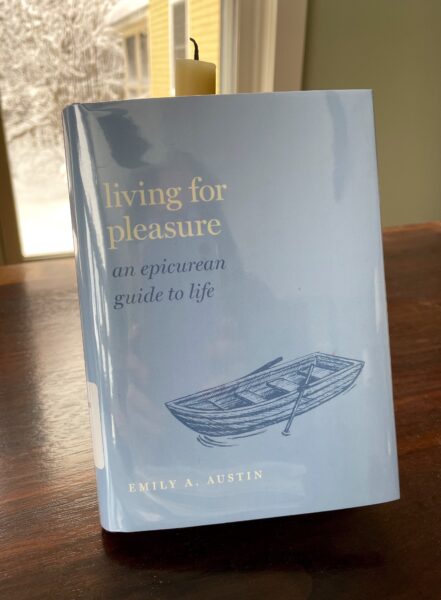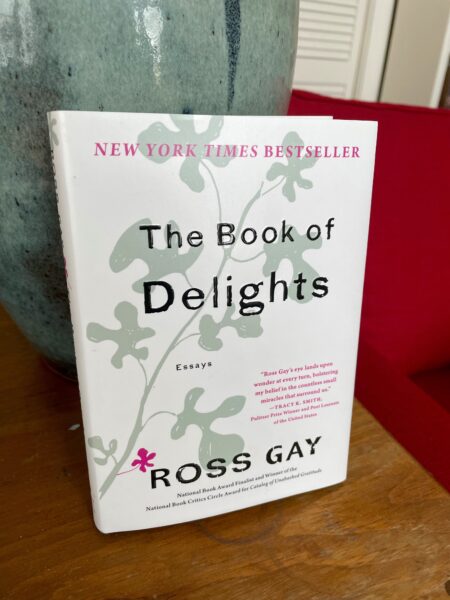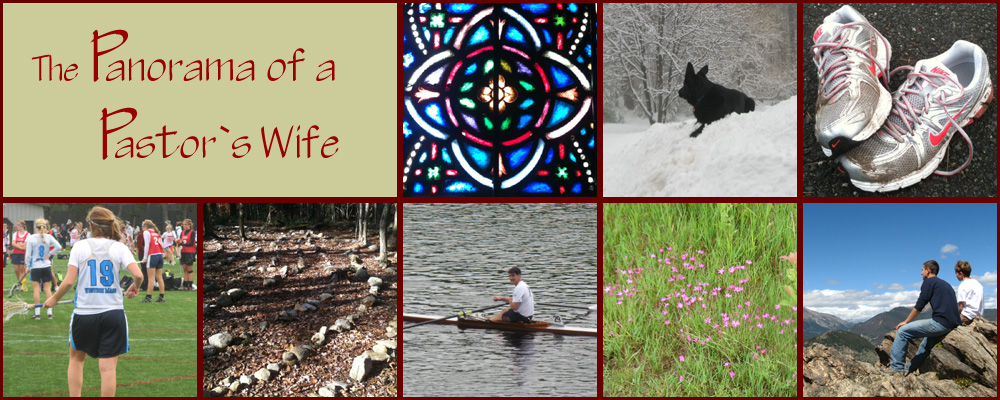Little Delights and Simple Pleasures
Life sure can wallop us, mercilessly, in a way that says, “Better find a way to deal with this pain, because you can’t wish it away.” Either we’re stinging from that kind of wallop right now, recovering from one we’ve already had, or cognizant that we will be walloped sometime in the future — we just don’t know when or how hard it will be.
And yet, every morning brings possibilities for the discovery of new joys.
Here in New England, we received a gift day yesterday with snow gently falling and (for those of us who were not essential workers) no requirements to go anywhere.

Ancient and Not So Ancient
Listening to a cardinal singing — more like insistently proclaiming — out there on this day afterwards, I’m thinking about two little books I’ve been reading. The first one I found while browsing at the library. Its front cover drew me in, with an empty rowboat in a sea of blue that could also be sky, as well as the intriguing title. I set myself to wondering, “What does living for pleasure mean? Am I doing that, or not? Is it the opposite of, say, living for duty? Do we need to take sides?” Familiar with bird and plant guides, but not with “epicurean” ones, I knew this sweet thing was coming home with me.

Those of us who like to cook might know “Epicurious” from an excellent website — the proper term is probably digital brand — featuring excellent recipes and kitchen skills. But those clever people at Conde Nast went way, way, way back to get this name, because “Epicurus” was in fact a real person who lived in Ancient Greece; he was born in 341 BCE (yes, that used to be just BC — another story). He probably did some cooking, but what he was most known for was being a philosopher; in fact he started a whole school of thought which came to be known as “Epicureanism.” According to Emily Austin, Professor of Philosophy at Wake Forest University, he and his cronies hung out in a place they called the “Garden.” Sounds nice, huh?
Now, I’m not fool enough to try to summarize what I’m learning from this book which I am savoring, but I can tell you that Epicurus apparently thought alot about the best ways of achieving happiness; how we should handle our desires; what constitutes healthy friendships; how to deal with inevitable setbacks. Here’s one passage, from Chapter Four, called “Natural Hedonism” :
Epicurean prudence is a calculating art that conjoins a knowledge of human psychology and the natural world with a keen eye for the future consequences of competing options. It requires understanding what will provide human beings the secure pleasure we naturally desire. (p. 34)
Far from being an advocate of a kind of “take what you want whenever you want” approach, Epicurus taught that we need to pay attention to the different kinds of desires we have, discerning which ones will bring us fulfillment and which ones will provide us with nothing of substance and even do damage (Austin calls these “corrosive”). He also sang the praises of strong friendships, believing that these relationships can form the bedrock of a life of pleasure.
I agree with him on this last point, enthusiastically. A couple of days ago, I met my friend-for-20 plus-years Mary Jo for a hike near Keene and it was so perfect. Whenever I get to see my friend-for-almost 10-years Sal (also a clergy spouse) for even an hour, and we share tales, laugh, and bolster one another, my spirit lifts. Good ol’ Epicurus would be smiling.

Give Us This Day Our Daily Wonders
Not one to shy away from reading two or three books at once, I went and found this other title — because I sensed it could be a companion to Austin’s — on my husband’s small shelf on his desk. I’d given it to him one of his pandemic birthdays, so I knew it was there.

Sure enough, I found that the two books, published just four years apart, fit nicely together. The fact that our daughter is finishing a graduate school program at UNC/Chapel Hill gives Ross Gay’s book a little extra cachet, too.
Gay, primarily a poet, had the idea on his 42nd birthday to write a short essay about some delightful thing he would witness on different days (there are 102, total, so he cut himself some slack) during that coming year. Some of these are creatures, some are gestures, some are just what he overhears people say. Here’s a snippet from Essay #7: “The Praying Mantis.”
Turns out this mantis has been my companion for the last twenty minutes, this whole break in my afternoon, edging closer to me, dancing, then scooting closer still. And when I sit back in my chair, the mantis pulls its head over the glass to see me (am I being egocentric?), swaying as it does so. Dancing. (p.21)
No big deal, really, but still a delight.
Generally, we use “pleasure” as a broad term — more akin to happiness — whereas “delight” is for something that comes and goes quickly, like a firefly in the night or a glimpse of a beautiful whatever we know won’t last.
I chose this scene from my photo archives to illustrate a recent delight I had: watching Rocky seeming to gaze at Rob’s luscious painting on our entryway wall. Knowing full well that a dog probably doesn’t muse about a work of art the way a human does, I still enjoyed seeing the juxtaposition of the two. The scene reinforced for me how much I love the painting, which I walk by multiple times a day, and also how strongly attached I am to the creature who presides here.

All That We Can Do
No, these two wee books won’t diminish any sorrows that we may encounter — or already have encountered — because those must be borne, felt honestly and fully, with as much wisdom as we can summon. I haven’t yet reached Chapter 11 of Living for Pleasure, but I see that the title of it is “Misfortune and Resilience.” And then Chapter 21 is “Experiencing Death.” I’m glad she included these. Ross Gay set out to capture only delights, and that’s fair enough, too. The things that wallop us? There’s usually no mistaking them, because they bring such hurt. But sometimes we let the tiny beauties drift off, when we might store them in our memories for later on, when we will surely need them.


Polly ~ Did Rob paint that luscious painting in your front hall? What a fun way to enter your place!
Yes, Linka, he certainly did! And since many of his paintings have featured dark tones (often, say, with strokes of bright yellow) this one was such a welcome surprise. Also love his boldness in “going big.” He’s a talented guy, all right.
This was a treat to read, Polly, and especially special, since I’m at our daughter’s in Durham, NC, just a few minutes from Chapel Hill. She did a masters in public health at UNCG/Greensboro. I highly recommend Be Holding, by Ross Gay. Even if you aren’t a basketball super fan, which I’m not, or a connoisseur of books of poetry, which I am, it’s a great American tale.
If North Carolina is any indication, spring is coming!
Thank you for this, Nancy! And our daughter, too, is in Durham and loves her particular neighborhood. She’s been sending us photos of early signs of spring. I will certainly check out this other book by Ross Gay. He has a buoyant spirit, for sure.
You begin this piece with a perhaps sad but alarmingly truthful declaration that we spend most of our lives either experiencing a difficult event, reflecting on past trauma, or nervously awaiting tragedy. In your closing paragraph, you note that the difficulties that wallop us tend to overpower our psyches, that they are impossible to ignore. What if life’s pleasures were just as consuming? In other words, what if we invited the experience of joy and delight to overwhelm us? I wonder how we could train our psyches so that we spend most of our lives experiencing, reflecting upon, or awaiting pleasure rather than tragedy.
Oh my, such a powerful truth here! While I didn’t intend to say that the “downs” we experience are necessarily more powerful than the “ups” — I don’t believe they need to be, actually, but of course every life is different — I see how the piece suggests that. Your invitation to “train our psyches so that we spend most of our lives experiencing, reflecting upon, or awaiting pleasure” is such an intriguing one, and YES, perhaps it is possible! These two books certainly encourage us to try. Thank you!
I’m with Polly! Henry has given us a powerful truth. I may not know how to train our psyches as he suggests, but I’m going to give it a try!
Perfect books, and your thoughtful reflections, and photos to brighten this time of year when winter seems endless even with a blanket of fresh, pretty, soft snow. At least there is more and more light each day which
we so need.
Thank You, and Love, Scottie
Thank YOU, Scottie! You are right on, as usual. Looking forward to that cup o’ tea before winter’s out…